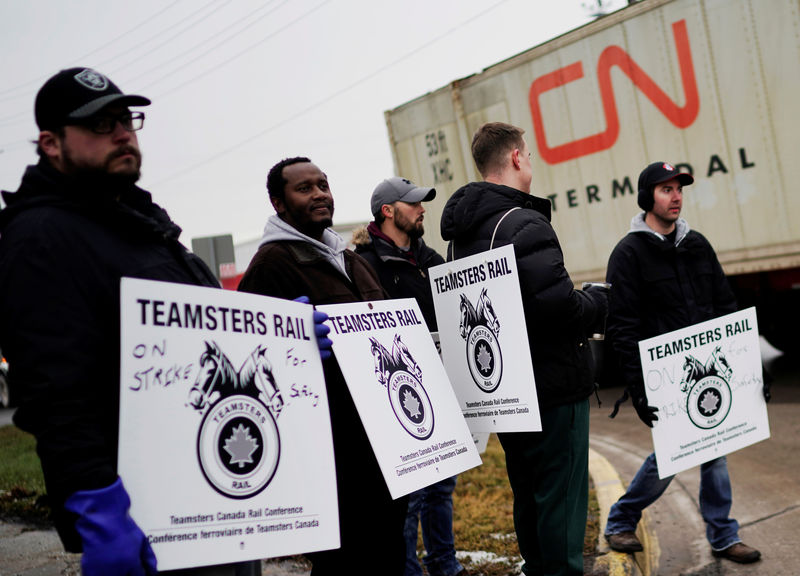By Allison Lampert and Rod Nickel
MONTREAL/WINNIPEG (Reuters) - Thousands of unionized Canadian National Railway (TO:CNR) workers on Tuesday held their first strike in a decade, which is set to disrupt grain and oil transportation and put pressure on Prime Minister Justin Trudeau's Liberal government.
About 3,000 workers, including conductors and yardmen from CN Rail, the country's largest railroad operator, hit picket lines, after both parties failed to resolve contract issues at a time of softening demand for freight service.
The two sides said they will continue talks on Tuesday in Montreal.
"We've made no progress with the company," Teamsters Canada spokesman Christopher Monette said.
Canada, one of the world's biggest exporters of farm products, relies on its two main railways to move canola and wheat over the vast distances from western farms to ports.
Crude oil shippers in Alberta have also increasingly used trains in the past year to reach U.S. refineries as an alternative to congested pipelines.
"We are disappointed that the TCRC has initiated strike action," CN said in a statement.
Canada's Liberal government sent two ministers on Monday to meet with representatives of CN and its largest union, as shippers pleaded for government intervention to avert a strike.
In a statement Tuesday, Labor Minister Patty Hajdu and Transport Minister Marc Garneau said they were monitoring the CN strike situation closely.
Trudeau's government, which relies on smaller parties to pass legislation, faces fierce criticism from western provinces about its failures to get new pipelines built.
"Railway needs to keep moving for the benefit of the Canadian economy – cutting off that movement of oil just after Keystone (oil pipeline) leaked again and is operating at reduced flow wouldn't be helpful," said John Zahary, CEO of Altex Energy, which operates terminals in western Canada that load oil onto trains.
CN's operations in the United States will continue operating despite the strike in Canada.
It's not clear if and when Trudeau's newly elected minority government would order the workers back on the job.
Under Canadian parliamentary rules any potential back-to-work legislation would only be considered after a new speaker is elected and the speech from the throne has been read. Canada's Parliament is currently set to return on Dec. 5.
The union said it is objecting to demands by CN which wants to reduce the amount of workers' time off in their contracts.
Rail workers with the Teamsters held their last strike in 2009, when locomotive engineers walked off the job for five days, the union said.

CN employed a total of 25,720 employees, as of Dec. 31, 2018.